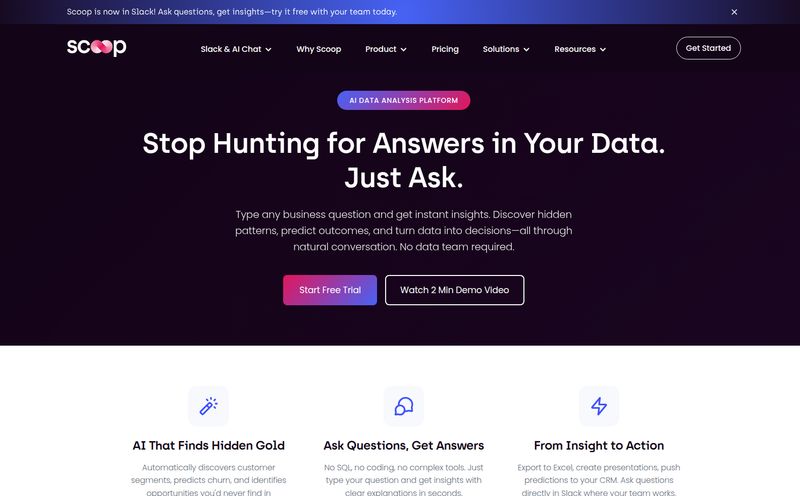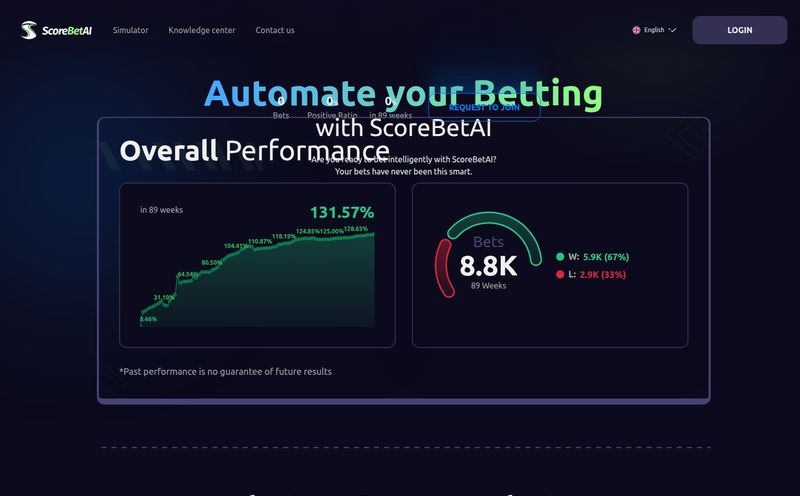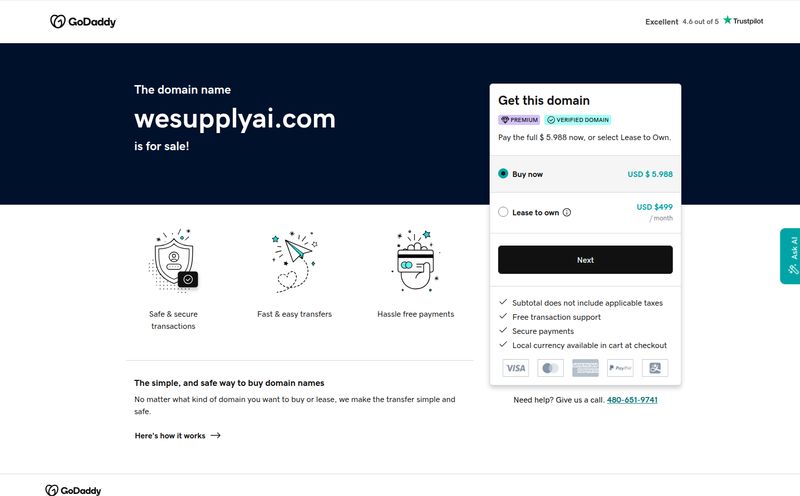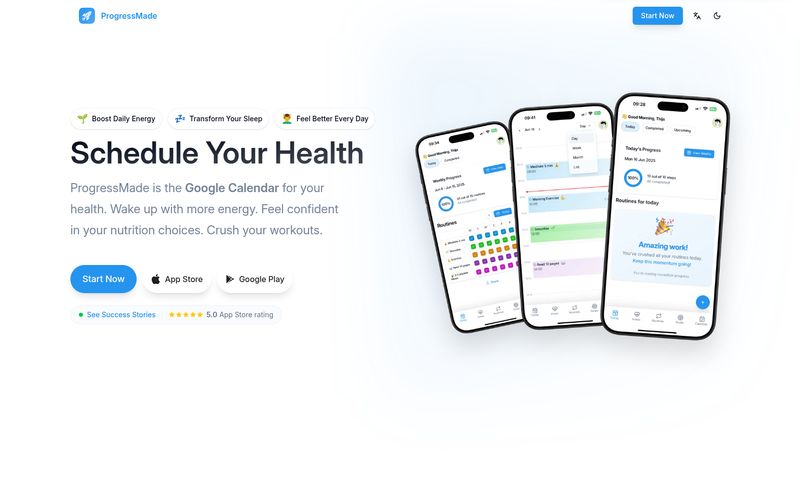We've all had that late-night thought, scrolling through our phones... how long have I actually got? It's a universal, if slightly unsettling, human curiosity. For centuries, we've looked to everything from palm readers to mystics. Now, in the age of big data and machine learning, we're looking to algorithms. And that's where tools like Death Clock AI step into the spotlight.
As someone who spends their days neck-deep in digital trends and traffic, I've seen countless AI-powered tools pop up, promising to optimize everything from your ad spend to your morning routine. But a tool that claims to calculate your life expectancy? That got my attention. It sounds like something straight out of a sci-fi movie. A bit creepy, a little fascinating, and definitely worth investigating. So, I poured a coffee, took a deep breath, and decided to see what this digital grim reaper was all about.
So, What Exactly Is This 'Death Clock AI' Thing?
At its core, Death Clock AI is a free online platform that uses artificial intelligence to estimate your life expectancy. But it’s not just about spitting out a date. That would be… well, pretty grim. Instead, the platform frames itself as a health and wellness tool. The whole idea is to take the data you provide—your age, lifestyle habits, health metrics—and give you personalized insights to help you make healthier choices. Think of it less as a countdown timer and more as a digital compass for your health journey, pointing you toward a longer, healthier path.
It's designed to analyze how your daily decisions, from your diet to your social life, might be impacting your long-term longevity. The goal is to inspire, not to intimidate.
My First Impressions and the User Experience
The first thing I noticed is how clean and un-scary the website is. It’s all green hues and friendly fonts, which immediately puts you at ease. They've clearly made an effort to position this as a positive experience.
The process itself is ridiculously simple, broken down into three steps:
- Enter Your Details: This is the data-gathering phase. You input basic info like your age, gender, height, and weight, along with more detailed lifestyle factors—your diet, exercise habits, smoking status, and alcohol consumption. The more honest you are, the more accurate the result will be. Garbage in, garbage out, as they say.
- Get an Instant Prediction: Once you hit submit, the AI gets to work. It crunches the numbers through its predictive models, comparing your data against vast datasets and health studies. This happens almost instantly.
- View & Share Results: This is the big reveal. You get your estimated life expectancy, but more importantly, a breakdown of why. The report offers insights into which of your habits are helping and which might be hurting.
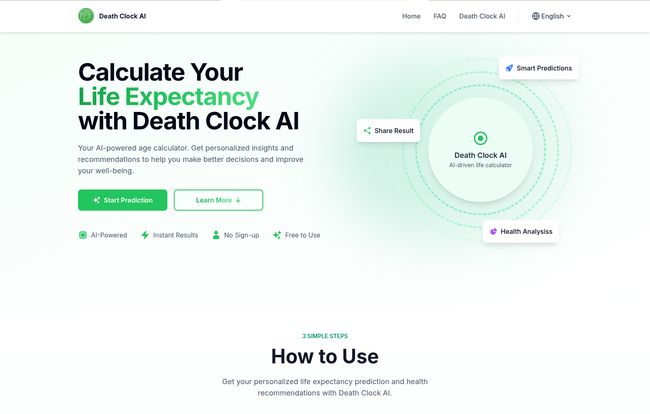
Visit Death Clock AI
Honestly, I was braced for something much more complex or clinical. The simplicity is a huge plus. It feels less like a medical exam and more like one of those surprisingly insightful online quizzes, just with a lot more science behind it.
Breaking Down the Features: More Than Just a Number
This is where Death Clock AI really differentiates itself from a simple 'death calculator'. It's not just a single number; it's a whole suite of analytical tools designed to give you a 360-degree view of your health.
Personalized Predictions and Health Monitoring
The main event is the AI-driven life expectancy analysis, sure. But it’s supported by features like a health tracking system and risk assessment. It doesn't just look at what you’re doing now; it attempts to model how your current trajectory will play out over time. It gives you a baseline, a starting point to work from, which is incredibly powerful for setting tangible health goals.
Lifestyle, Nutrition, and Even Your Social Life
Here’s what really impressed me. The platform goes beyond the obvious stuff like smoking. It includes a detailed lifestyle assessment that looks at your physical activity levels and even your stress. There are smart dietary recommendations, a calorie intake tracker, and personalized meal plan suggestions. It’s like having a little AI nutritionist in your pocket.
But it gets even more nuanced. The tool analyzes environmental factors like air pollution and climate conditions based on your location. It even has a section for Social Connections, assessing your relationships with family and community involvement. This is a brilliant touch. It reflects the modern understanding of health, which, as studies from places like the WHO constantly remind us, is about so much more than just diet and exercise. Our social bonds are a massive factor in our overall well-being and longevity.
The Big Question: Is It Accurate?
Okay, let's address the elephant in the algorithm. Can a website really predict when you'll die? The short answer is no. Of course not. And to its credit, Death Clock AI doesn't claim to be a Nostradamus machine.
The predictions are estimates. They are based on statistical probabilities derived from the data you enter. The platform's accuracy is entirely dependent on two things: the quality of the data it's been trained on and the honesty of the data you provide. It also can’t account for everything. It won't know about a rare genetic condition you have unless you can input it, and it can't predict unforeseen events. Life is beautifully, and sometimes tragically, random.
So, you should view the result not as a definitive deadline, but as a data-driven piece of feedback. It's a wake-up call or a pat on the back. It’s a tool to motivate change, not a prophecy set in stone. I think that's the healthiest way to approach it.
The Good, The Bad, and The Algorithmic
So, what’s the final verdict? What I really like is the focus on actionable advice. It doesn't just give you a number; it gives you a 'why' and a 'how-to-fix-it'. The user interface is fantastic, making a potentially heavy topic feel approachable and even positive. The comprehensive nature of the analysis, especially including social and environmental factors, is a major win. And perhaps the biggest pro of all? It’s completely free to use. There are no hidden fees or premium unlocks, which is refreshing.
On the flip side, the limitations are real. The predictions are only estimates, and their value is tied directly to your input's accuracy. Some users might take the prediction too literally, which could cause unnecessary anxiety. It’s a powerful tool, and with great power comes… well, you know the rest. You have to use it with the right mindset.
How Much Does This Glimpse into the Future Cost?
This will be a short section. It costs nothing. Nada. Zilch.
The Death Clock AI tool is 100% free. There's no pricing page, no subscription model, no credit card required. In a world of endless SaaS subscriptions, that's a pretty big deal. This commitment to free access means anyone with an internet connection and a bit of curiosity can get these personalized health insights.
Frequently Asked Questions (FAQs)
I browsed through the site’s own FAQ and picked out the questions I think are most critical for a new user.
- How does Death Clock AI actually work?
- It uses a combination of AI and machine learning algorithms. These algorithms analyze the data you provide (like age, lifestyle, medical history) against massive public health datasets and scientific literature to find correlations and predict statistical life expectancy.
- Is my personal data safe with this tool?
- According to their website, they take data privacy seriously, employing state-of-the-art security and privacy protocols to protect user information. As with any online tool, it's always good practice to be mindful of the data you share, but their stated commitment is to user privacy.
- What kind of data does it analyze?
- It's comprehensive. It looks at demographic data (age, gender), lifestyle habits (diet, exercise, smoking), biometrics (BMI), medical history, and even extends to environmental and social factors like your location and community ties.
- Can I really improve my life expectancy with its tips?
- Yes, that's the whole point! The tool gives you specific, actionable steps based on your personal data. By following the recommendations for diet, exercise, and lifestyle changes, you can positively influence your health metrics, which in turn can lead to a longer, healthier life.
- Can I share my Death Clock AI results with my doctor?
- Absolutely. The platform allows you to share your detailed report. It could be a fantastic conversation starter with a healthcare professional, giving them a quick, holistic overview of your lifestyle and perceived health risks.
Final Thoughts: Is Death Clock AI Worth Your Time?
After spending some real time with the tool, I’ve moved from morbidly curious to genuinely impressed. Is it perfect? No. Is it a funhouse mirror that reflects a possible version of your future based on your current habits? Yes. And that's incredibly valuable.
If you're looking for an exact date and time, this isn't it. But if you're looking for a free, powerful, and surprisingly holistic tool to give you a kick in the pants and motivate you to live a little healthier, then Death Clock AI is absolutely worth a look. It takes a scary concept and turns it into a source of empowerment. And in my book, any tool that helps people take better care of themselves is a net positive for the world.
Just remember to take the results with a grain of salt and a whole lot of proactive optimism.
Reference and Sources
- Death Clock AI Official Website: https://declom.ai/
- World Health Organization (WHO) - Social Determinants of Health: https://www.who.int/news-room/fact-sheets/detail/social-determinants-of-health
